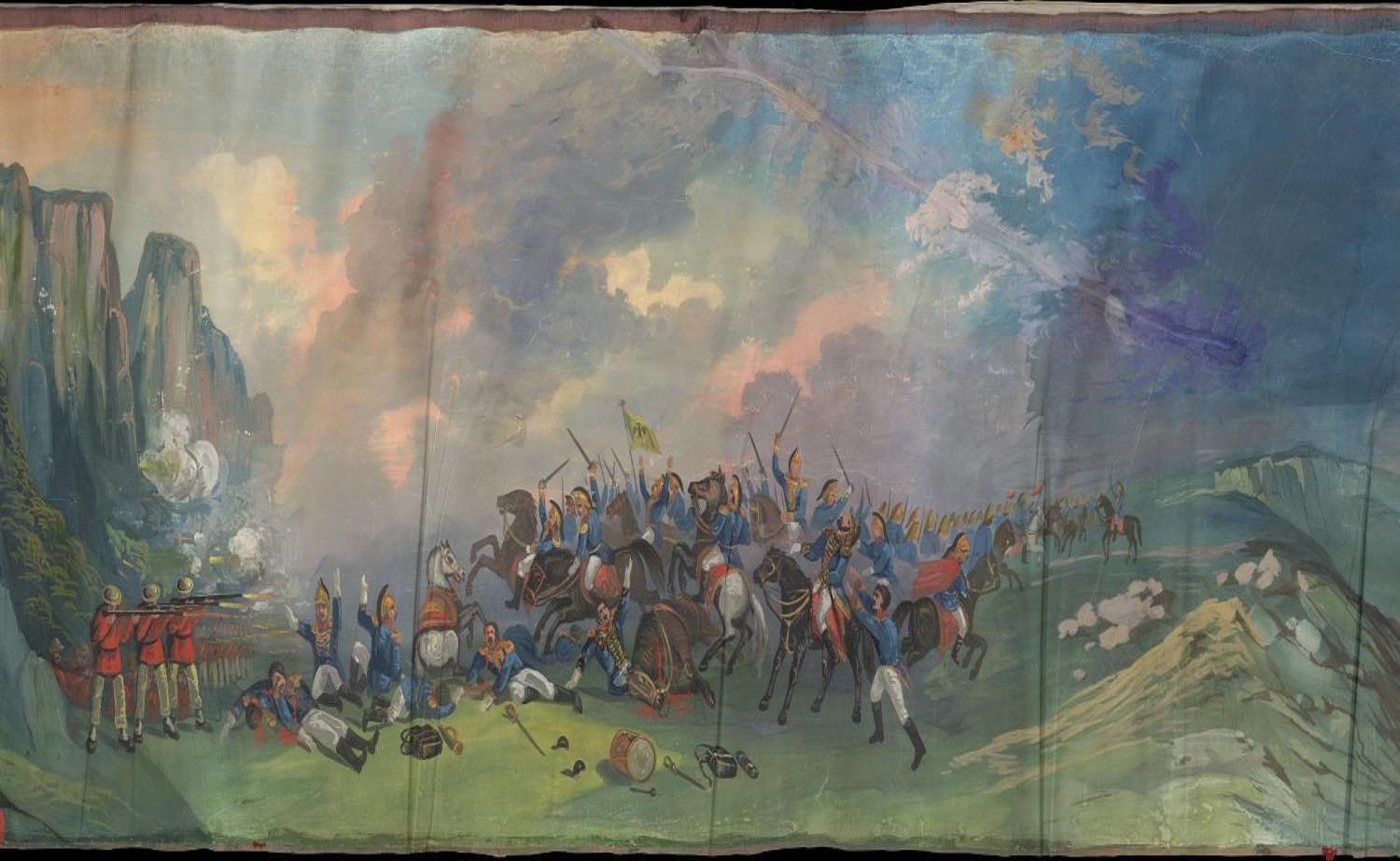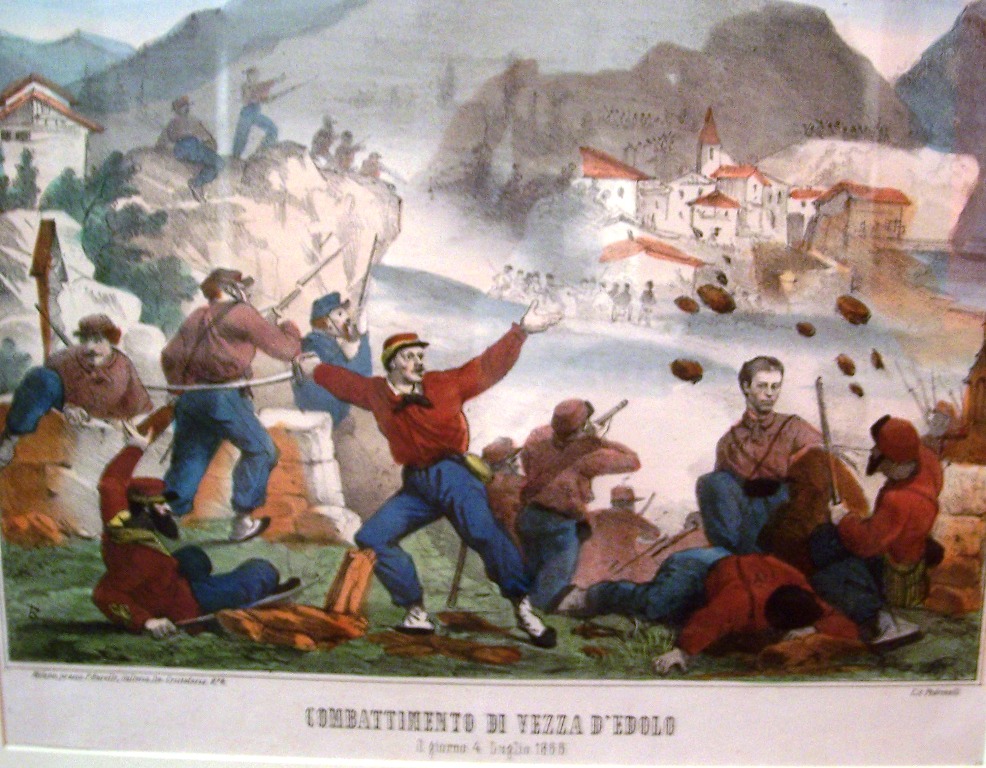|
Battle Of Bezzecca
The Battle of Bezzecca was fought on 21 July 1866 between Italy and Austria, during the Third Italian Independence War. The Italian force, the Hunters of the Alps, were led by Giuseppe Garibaldi, and had invaded Trentino as part of the general Italian offensive against the Austrian force occupying north-eastern Italy after the decisive Prussian victory of Battle of Königgrätz, which had led Austria to move part of their troops towards Vienna (see Invasion of Trentino). The Austrians, commanded by ''Generalmajor'' Franz Kuhn von Kuhnenfeld, attacked and occupied the city of Bezzecca. The Italians uncoordinately tried to recover the lost town. Garibaldi himself, moving on the battlefield in a coach because of a wound from a previous encounter, was in danger of being captured. The Italian artillery took a hill close to the town, and an assault by the Italian infantry caused the Austrians to withdraw to their emplacements in the surrounding mountains, thus marking an Italian vict ... [...More Info...] [...Related Items...] OR: [Wikipedia] [Google] [Baidu] |
Third Italian War Of Independence
The Third Italian War of Independence ( it, Terza Guerra d'Indipendenza Italiana) was a war between the Kingdom of Italy and the Austrian Empire fought between June and August 1866. The conflict paralleled the Austro-Prussian War and resulted in Austria conceding the region of Venetia (present-day Veneto, Friuli and the city of Mantua, the last remnant of the ''Quadrilatero'') to France, which were later annexed by Italy after a plebiscite. Italy's acquisition of this wealthy and populous territory represented a major step in the Unification of Italy. Background Victor Emmanuel II of Savoy had been proclaimed King of Italy on 17 March 1861 but did not control Venetia or the much-reduced Papal States. The situation of the , a later Italian term for part of the country under foreign domination that literally meaning ''unredeemed'', was an unceasing source of tension in the domestic politics of the new kingdom and a cornerstone of its foreign policy. The first attempt to seize ... [...More Info...] [...Related Items...] OR: [Wikipedia] [Google] [Baidu] |
Invasion Of Trentino (1866)
The Invasion of Trentino was a series of military operations undertaken by the Kingdom of Italy against the Austrian Empire during the Third Italian War of Independence of 1866, which was part of the larger Austro-Prussian War. Background At the outbreak of the Third Italian war of Independence (June 23, 1866), Giuseppe Garibaldi received the order to take up positions with his volunteer force, the "Corpo Volontari Italiani", along the frontline between Lombardy and the southernmost part of the County of Tyrol, which today corresponds to the Italian province of Trentino. Initially Garibaldi could only muster four battalions, but in the end managed to obtain some 38,000 men, which were to face the roughly 15,000 Austrian regulars under General Baron Franz Kuhn von Kuhnenfeld. The Austrians were supported by their flotilla on Lake Garda. First actions Garibaldi's men started the fights on June 21, 1866. After some initial minor clashes, they were, due to the Italian defeat at ... [...More Info...] [...Related Items...] OR: [Wikipedia] [Google] [Baidu] |
1866 In The Austrian Empire
Events January–March * January 1 ** Fisk University, a historically black university, is established in Nashville, Tennessee. ** The last issue of the abolitionist magazine '' The Liberator'' is published. * January 6 – Ottoman troops clash with supporters of Maronite leader Youssef Bey Karam, at St. Doumit in Lebanon; the Ottomans are defeated. * January 12 ** The ''Royal Aeronautical Society'' is formed as ''The Aeronautical Society of Great Britain'' in London, the world's oldest such society. ** British auxiliary steamer sinks in a storm in the Bay of Biscay, on passage from the Thames to Australia, with the loss of 244 people, and only 19 survivors. * January 18 – Wesley College, Melbourne, is established. * January 26 – Volcanic eruption in the Santorini caldera begins. * February 7 – Battle of Abtao: A Spanish naval squadron fights a combined Peruvian-Chilean fleet, at the island of Abtao, in the Chiloé Archipelago of southern Chile. * February 13 – ... [...More Info...] [...Related Items...] OR: [Wikipedia] [Google] [Baidu] |
1866 In Italy
Events January–March * January 1 ** Fisk University, a historically black university, is established in Nashville, Tennessee. ** The last issue of the abolitionist magazine '' The Liberator'' is published. * January 6 – Ottoman troops clash with supporters of Maronite leader Youssef Bey Karam, at St. Doumit in Lebanon; the Ottomans are defeated. * January 12 ** The ''Royal Aeronautical Society'' is formed as ''The Aeronautical Society of Great Britain'' in London, the world's oldest such society. ** British auxiliary steamer sinks in a storm in the Bay of Biscay, on passage from the Thames to Australia, with the loss of 244 people, and only 19 survivors. * January 18 – Wesley College, Melbourne, is established. * January 26 – Volcanic eruption in the Santorini caldera begins. * February 7 – Battle of Abtao: A Spanish naval squadron fights a combined Peruvian-Chilean fleet, at the island of Abtao, in the Chiloé Archipelago of southern Chile. * February 13 ... [...More Info...] [...Related Items...] OR: [Wikipedia] [Google] [Baidu] |
Battles Of The Third Italian War Of Independence
A battle is an occurrence of combat in warfare between opposing military units of any number or size. A war usually consists of multiple battles. In general, a battle is a military engagement that is well defined in duration, area, and force commitment. An engagement with only limited commitment between the forces and without decisive results is sometimes called a skirmish. The word "battle" can also be used infrequently to refer to an entire operational campaign, although this usage greatly diverges from its conventional or customary meaning. Generally, the word "battle" is used for such campaigns if referring to a protracted combat encounter in which either one or both of the combatants had the same methods, resources, and strategic objectives throughout the encounter. Some prominent examples of this would be the Battle of the Atlantic, Battle of Britain, and Battle of Stalingrad, all in World War II. Wars and military campaigns are guided by military strategy, whereas b ... [...More Info...] [...Related Items...] OR: [Wikipedia] [Google] [Baidu] |
Battles Involving Austria
A battle is an occurrence of combat in warfare between opposing military units of any number or size. A war usually consists of multiple battles. In general, a battle is a military engagement that is well defined in duration, area, and force commitment. An engagement with only limited commitment between the forces and without decisive results is sometimes called a skirmish. The word "battle" can also be used infrequently to refer to an entire operational campaign, although this usage greatly diverges from its conventional or customary meaning. Generally, the word "battle" is used for such campaigns if referring to a protracted combat encounter in which either one or both of the combatants had the same methods, resources, and strategic objectives throughout the encounter. Some prominent examples of this would be the Battle of the Atlantic, Battle of Britain, and Battle of Stalingrad, all in World War II. Wars and military campaigns are guided by military strategy, wherea ... [...More Info...] [...Related Items...] OR: [Wikipedia] [Google] [Baidu] |
Battles Involving Italy
A battle is an occurrence of combat in warfare between opposing military units of any number or size. A war usually consists of multiple battles. In general, a battle is a military engagement that is well defined in duration, area, and force commitment. An engagement with only limited commitment between the forces and without decisive results is sometimes called a skirmish. The word "battle" can also be used infrequently to refer to an entire operational campaign, although this usage greatly diverges from its conventional or customary meaning. Generally, the word "battle" is used for such campaigns if referring to a protracted combat encounter in which either one or both of the combatants had the same methods, resources, and strategic objectives throughout the encounter. Some prominent examples of this would be the Battle of the Atlantic, Battle of Britain, and Battle of Stalingrad, all in World War II. Wars and military campaigns are guided by military strategy, wherea ... [...More Info...] [...Related Items...] OR: [Wikipedia] [Google] [Baidu] |
Attack Of The Austrians
Attack may refer to: Warfare and combat * Offensive (military) * Charge (warfare) * Attack (fencing) * Strike (attack) * Attack (computing) * Attack aircraft Books and publishing * ''The Attack'' (novel), a book * ''Attack No. 1'', comic and animation * Attack! Books, a publisher * ''Attack!'' (publication), a tabloid publication of the National Alliance established in 1969. The name was changed to '' National Vanguard'' in 1978 * ''Der Angriff'', a.k.a. ''The Attack'', a newspaper franchise * In newspaper headlines, to save space, sometimes " criticise" Films and television * Attack! The Battle of New Britain a 1944 American armed forces documentary film * ''Attack'' (1956 film), also known as ''Attack!'', a 1956 American war film * ''Attack'' (2016 film), a 2016 Telugu film * ''Attack'' (2022 film), a 2022 Hindi film * ''The Attack'' (1966 film), an Australian television play * ''The Attack'' (2012 film), a 2012 film directed by Ziad Doueiri * "The Attack" (''Austra ... [...More Info...] [...Related Items...] OR: [Wikipedia] [Google] [Baidu] |
Alfonso Ferrero La Marmora
Alfonso Ferrero La Marmora (; 18 November 18045 January 1878) was an Italian general and statesman. His older brothers include soldier and naturalist Alberto della Marmora and Alessandro Ferrero La Marmora, founder of the branch of the Italian army now called the Bersaglieri. Biography Born in Turin, he entered the Sardinian army in 1823, and was a captain in March 1848, when he gained distinction and the rank of major at the . On 5 August 1848 he liberated Charles Albert of Sardinia from a revolutionary mob in Milan, and in October was promoted general and appointed Minister of War. After suppressing the revolt of Genoa in 1849, he again assumed in November 1849 the portfolio of war, which, save during the period of his command of the Crimean expedition, he retained until 1859. This cites G. Massani, ''Il generale Alfonso La Marmora'' (Milan, 1880) He took part in the war of 1859 against Austria; and in July of that year succeeded Cavour in the premiership. In 1860 he was ... [...More Info...] [...Related Items...] OR: [Wikipedia] [Google] [Baidu] |
Armistice Of Cormons
The Armistice of Cormòns was signed in Cormons on 12 August 1866, between the Kingdom of Italy (represented by General Count Agostino Petitti Bagliani di Roreto) and the Austrian Empire (represented by General Baron Karl Möring) and was a prelude to the Treaty of Vienna, which ended the Third Italian War of Independence. On 21 July 1866 the victorious Prussia, which had just inflicted a decisive defeat on Austrian army at the battle of Sadowa, signed the Armistice of Nikolsburg (without consulting the Italian allies). In the same days the Italian Navy was defeated in the Battle of Lissa. On the contrary the Army was taking advantage of the redeployment of many Austrian units to the northern front. Garibaldi's volunteers, reinforced by regular units, gained terrain by invading Trentino and achieved a victory at Bezzecca; the main Italian army led by general Enrico Cialdini reached Udine, while a secondary army led by general Alfonso La Marmora was contemporary blocking some ... [...More Info...] [...Related Items...] OR: [Wikipedia] [Google] [Baidu] |
Vienna
en, Viennese , iso_code = AT-9 , registration_plate = W , postal_code_type = Postal code , postal_code = , timezone = CET , utc_offset = +1 , timezone_DST = CEST , utc_offset_DST = +2 , blank_name = Vehicle registration , blank_info = W , blank1_name = GDP , blank1_info = € 96.5 billion (2020) , blank2_name = GDP per capita , blank2_info = € 50,400 (2020) , blank_name_sec1 = HDI (2019) , blank_info_sec1 = 0.947 · 1st of 9 , blank3_name = Seats in the Federal Council , blank3_info = , blank_name_sec2 = GeoTLD , blank_info_sec2 = .wien , website = , footnotes = , image_blank_emblem = Wien logo.svg , blank_emblem_size = Vienna ( ; german: Wien ; ba ... [...More Info...] [...Related Items...] OR: [Wikipedia] [Google] [Baidu] |
Bezzecca
Bezzecca was a ''comune'' (municipality) in Trentino in the Italian region Trentino-Alto Adige/Südtirol. On January 1, 2010 it merged (with Pieve di Ledro, Concei, Molina di Ledro, Tiarno di Sopra and Tiarno di Sotto) in the new municipality of Ledro. on l'Adige It is located about 35 km southwest of . History On July 21, 1866 the village was the theatre of a battle part of theThird Italian War of Independence
The ...
[...More Info...] [...Related Items...] OR: [Wikipedia] [Google] [Baidu] |








